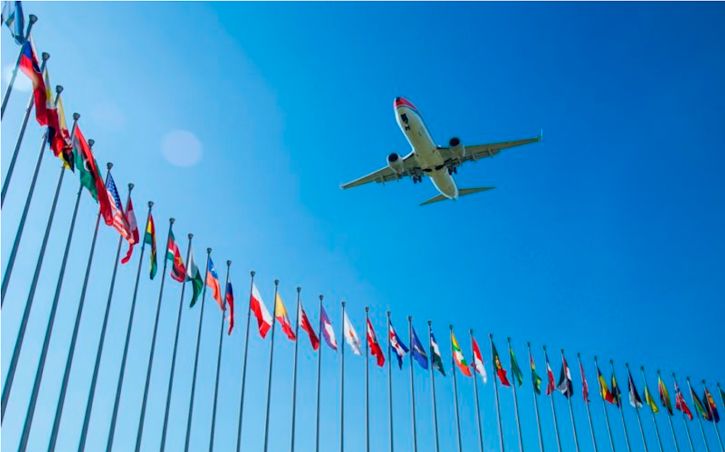ICAO, IATA, BSP in a Brief
ICAO - International Civil Aviation Organization
The Convention on International Civil Aviation, drafted in 1944 by 54 Nations, was established to Promote Cooperation and “Create and Preserve Friendship and Understanding among the Nations and Peoples of the world.” Known more commonly today as the ‘Chicago Convention’, this landmark agreement established the core principles permitting International Transport by Air and led to the creation of the Specialised Agency which has overseen it ever since – the International Civil Aviation Organization (ICAO).
ICAO is funded and directed by 193 National Governments to support their Diplomacy and Cooperation in Air Transport as Signatory States to the Chicago Convention (1944). Its core function is to maintain an administrative and expert bureaucracy (the ICAO Secretariat) supporting these Diplomatic Interactions, and to research new Air Transport Policy and Standardisation Innovations as Directed and Endorsed by Governments through the ICAO Assembly or by the ICAO Council which the assembly elects.
Industry and Civil Society Groups, and other concerned Regional and International Organizations also participate in the Exploration and Development of new Standards at ICAO in their capacity as ‘Invited Organizations’. As new Priorities are Identified by these Stakeholders, the ICAO Secretariat convenes Panels, Task Forces, Conferences and Seminars to explore their Technical, Political, Socio-Economic and other aspects. It then provides governments with the best results and advice possible as they Collectively and Diplomatically Establish new International Standards and Recommended practices for Civil Aviation Internationally.
The stipulations ICAO standards contain never supersede the primacy of national regulatory requirements. It is always the Local, National Regulations which are enforced in and by Sovereign States and which must be legally Adhered to by Air Operators making use of applicable Airspace and Airports.
Vision:
Achieve the Sustainable Growth of the Global Civil Aviation System.
Mission:
To serve as the Global Forum of States for International Civil Aviation. ICAO develops Policies and Standards, Undertakes Compliance Audits, Performs Studies and Analyses, Provides Assistance and Builds Aviation Capacity through many other Activities and the Cooperation of its Member States and Stakeholders.
The ICAO Council
The Council is a Permanent body of the Organization responsible to the Assembly. It is composed of 36 Member States elected by the Assembly for a three-year term. In the election, adequate representation is given to States of Chief Importance in Air Transport, States not otherwise included but which make the Largest Contribution to the provision of facilities for International Civil Air Navigation and States not otherwise included whose designation will ensure that all major Geographic areas of the world are Represented on the Council.
The Council Convenes the Assembly.
IATA - International Air Transport Association
IATA is International Air Transport Association the Trade Association for the World’s Airlines, Representing some 290 Airlines or 82% of total air traffic. IATA support many areas of Aviation Activity and help Formulate Industry Policy on Critical Aviation Issues.
Mission:
IATA’s mission is to Represent, Lead and Serve the Airline Industry…
IATA aims at providing a good and efficient service for both Passengers and Airline Companies. IATA provides specialty in High Speed, Eligibility, Safety, Productivity and also Inspects Pricing Policies such as; ticket and service fees along with the firm commissions. IATA works through a membership program.
Policy:
IATA usually prepare and formulate Policies for Aviation Industry worldwide. Such as:
- Worldwide Airport Slots
- Consumer & Passenger Issues
- Taxation
- Environment Policy
- Infrastructure
- Smarter Regulation
- Business of Freedom
- Future of Industry
Services:
Synergies, efficiencies and direct results IATA's wide range of products and services can support the ongoing efforts of many functions within your organisation: Finance, Security, Operations, Strategic Management, Safety and much more.
When you select IATA, you benefit from our global view and the strategic role we play in the aviation industry.
- Accreditation - Travel & Cargo.
- Intelligence and Statistics.
- Compliance Solutions.
- Financial Services.
- Consulting.
- Safety & Flight Operations Solutions
- IATA Codes.
- Advertising.
Training:
IATA develops professionals for tomorrow's air transport industry. It has lots of effective and certified training for aviation industry professionals.
BSP or Billing and Settlement Plan is an IATA electronic billing system to run and simplify the interchange of data and funds between travel agencies and airlines. Sounds complicated, but in plain English, BSP is a payment mediator between airlines and travel agents.
BSP is a system designed to facilitate and simplify the selling, reporting and remitting procedures of IATA Accredited Passenger Sales Agents, as well as improve financial control and cash flow for BSP Airlines.
A truly worldwide system: there are BSP operations in some 180 countries and territories. The system currently serves more than 370 participating airlines with an on-time settlement rate of 99.999%. In 2017, IATA's BSP processed $236.3 billion.
Benefits of BSPlink
Simplification
- Agents issue one sales report and remit one amount to a central point
- Airlines receive one settlement covering all agents
- Simplifies and reduces work through the use of electronic ticketing on behalf of all BSP Airlines
- Agents’ sales are reported electronically
Savings
- Less resources required for billing and collection
- Electronic distribution of billing reports and generation of debit/credit memos (ADMs/ACMs) via BSPlink
Enhanced Control
- Increased financial control thanks to centralisation and grouping
- Consolidated document flow, permitting accelerated quality controls
- Overall process monitoring by a neutral body
Participation
Airlines
Participation in a BSP is open to all airlines (IATA members and non-members) serving the country or area concerned.
IATA Accredited Agents
All IATA Accredited Agents in the BSP country of operation are automatically eligible for participation in a BSP. When a new BSP commences operations in a country, all Agents are notified by IATA and invited to participate.
General Sales Agents (GSAs) and Airport Handling Agents (AHA)
GSAs and AHAs may participate in a BSP (in the same way as Accredited Agents), on nomination by the airline they represent, and subject to the airline entering into a standard agreement.







Comments
Post a Comment